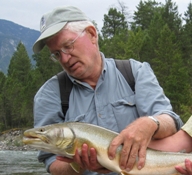Friends and family gathered last weekend at a memorial in Cambridge, Massachusetts, to celebrate the remarkable conservation legacy of Theodore McRoberts Smith, known to one and all as Ted. It was an inspiring, warm, and wonderful commemoration of a visionary leader — and Ted would have hated it. He never liked to be in the spotlight and he rarely claimed credit for his achievements, preferring to let others take the plaudits. Despite that, his achievements were many and his gift for inspiring a new generation of conservation leaders was extraordinary.
A trailblazer for environmental giving
After spending the first years of his career working for the Ford Foundation in Indonesia, and for the World Bank and the Rockefeller Foundation, Ted became the founding director of the Consultative Group on Biodiversity and then for many years was the Executive Director of the Henry P. Kendall Foundation. In these roles he was a pioneer in designing and funding large-scale conservation initiatives in Alaska, Canada, and the Rocky Mountain West and was instrumental in the creation of the Yellowstone to Yukon Conservation Initiative.
In the late 1990s, together with his close friend Bill Moomaw (a climate scientist at Tufts University and UCS National Advisory Board member), Ted conceived the idea of Clean Air-Cool Planet. It was to be a New England non-profit focused on the then almost revolutionary idea of not waiting for Washington to solve climate change, but mobilizing civil society to take the lead and take practical action at the local level.
My contact with Ted was through my 13 years as director of Clean Air-Cool Planet, where, as a board member, he was a constant voice for strategic clarity and stretching to meet challenging goals. He saw earlier than most the urgency of addressing climate issues at the local level, the work I’m now engaged with as director of the new climate impacts initiative at UCS.
A mentor to many
He was a visionary leader, a remarkable wilderness advocate, and a true innovator in the world of conservation and climate philanthropy. He was charming, he was funny, and no one will deny he could be a bit of a curmudgeon too, but what made him truly extraordinary was the role of mentor he took in so many young conservation leaders’ careers.
It’s only since he passed away that most of us who knew him have learned just how many people had a story to tell of how Ted helped guide or kick-start their career and how he remained a guiding presence always ready to give advice or a helping hand for years to come. Many of those stories were told over tea and lemonade in the Friends Meeting House at a reception after the memorial. I don’t think I have ever met someone who so many claim as a mentor as Ted Smith. And that alone is a legacy to be proud of.
Coming full circle in Montana

Ted Smith flew smokejumping missions out of Missoula, MT in the 1962-64 fire seasons
Ted retired just a few years ago and moved back to his native Montana. He was a life-long outdoorsman, who by all accounts was never happier than when he was hiking in wilderness, picknicking by a mountain lake, or fishing a backcountry stream. His brother Roger remembers that even as young teens, their parents would drop them off at some distant trailhead with a sub-standard sleeping bag and too little food and arrange to meet them several days later. They survived just fine.
As a graduate student at Berkeley, Ted worked the summers as a smokejumper literally parachuting in to fight the toughest fires in roadless forest tracts. His love of wilderness drew him back to re-settle in Montana after a career spent in Indonesia, New York, and Boston. Tragically, he died in a hiking accident in the remote Mission Mountains near St. Ignatius, Montana, last September. But as more than one person remarked at the memorial ceremony he died doing what he loved best in the place he loved above all.
The next generation of environmental leaders
The Alaska Conservation Foundation and Clean Air-Cool Planet have both created youth leadership programs in Ted’s honor. This summer as part of the UCS Climate Impacts Initiative I’ll be mentoring two students who will be working under the CA-CP program in partnership with the Absaroka-Beartooth Wilderness Foundation to survey and record the devastating impacts climate-driven mountain pine beetle epidemics are having on the whitebark pine forests of Montana. I hope I can be even partially as good a guide and advisor to these young scientists as Ted clearly was to so many of the people who turned out to celebrate his life and conservation legacy last weekend.

